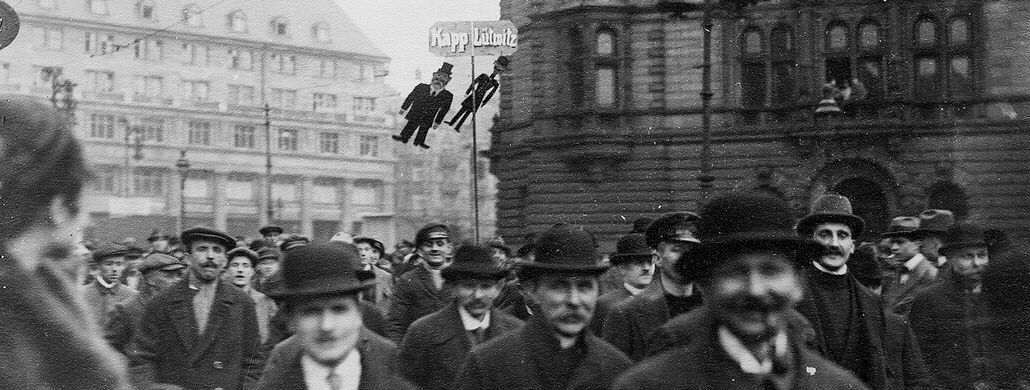
[Rhineland and Berlin, March 1920] The first years of the Weimar Republic were almost civil war like. The deep division of the country, the hatred and the violent radicalization aggrieved Kathi and Max.
They had mourned with Max for Hugo Haase, the upright and pacifist chairman of the Independent Social Democratic Party. He had been seriously injured in an assassination attempt and died as a result. Since then, the left wing of the USPD had been gaining ground, and the party was moving closer and closer to the Communist Party. Max withdrew because he could not support this course.
Biased legal authorities
The murderers of Rosa Luxemburg and Karl Liebknecht got off with lenient sentences. Leo Jogiches, Rosa’s partner, who had gotten the prosecution on track, was arrested and shot in the back. The murderer of the Bavarian Prime Minister Eisner (Independents) got off with a short prison sentence. “If the whole German youth were imbued with such a glowing enthusiasm we could face the future with confidence”, the judge had said. In the eyes of the far right, the murderer was a hero.
All this would encourage the anti-Republican militarists to take the fight against the republic into their own hands. “How damned biased our justice is,” thought Max, “they do turn a blind to the activities of the radical Right.”
Kapp-Lüttwitz Putsch
Under the disarmament provisions of the Treaty of Versailles, some 300,000 soldiers of the Reichswehr (the German army) and all soldiers of the Free Corps had to be discharged. That caused great embitterment among the Free Corps who had fought against the Red Army and Polish volunteer units in the East and surpressed the January uprisings on orders of the Weimar Goverment.
Among the first units to be ordered disbanded was the Marine Brigade of Captain Hermann Ehrhardt. Late in the evening of March 12, General Lüttwitz, highest-ranking general in the Reichswehr, staged a coup. The following night, the Ehrhardt Brigade marched into Berlin, occupied the government buildings and installed the staunch right-wing politician Wolfgang Kapp as new chancellor.
Defense minister Noske ordered Reichswehr General Hans von Seeckt to suppress the putsch. Von Seeckt refused: “There can be no question of sending the Reichwehr to fight these people.” Meanwhile, many military officers had sided with the putschists. The government was forced to flee from Berlin to Dresden. The SPD members of the government and Otto Wels, head of the SPD, called for a general strike throughout the country. Soon, people all over the country went on strike and protested against the coup. In Berlin, neither government officials nor the Reichsbank took instructions from Kapp.
Demonstration against Kapp and Lüttwitz in Bonn
On 15 March in Bonn, Kathi and Max demonstrated with 50,000 people against the putsch. “So many people are here,” Kathi marveled, and she looked happy despite the surrounding tension. It had not been so easy to get here, for there was no train, no tram, and also the ships participated in the strike. “I’d love to see Kapp’s face,” she said. “They have neither electricity nor water in Berlin, nothing is going on. It is great that so many people defend our republic. You can no longer just putsch against a democratic government!”
Max stood beside her. “Yes,” he said, “it gives me new courage too. Yet, many military leaders have joined forces with Kapp and Lüttwitz, and General von Seeckt has refused to protect the government! As a soldier, I can feel with him, I would not want to fire at comrades either. But his actions were entirely illegal, Ebert is the Supreme Commander in Chief, and Seeckt has sworn the Reichswehr oath to defend the republic. And yet, he gets away with it. The government has fled. We are not lacking democrats, but democrats in the leading positions of the military. They won’t stand up for our republic.”
The civil servants in Berlin refused to take orders from Kapp, and the general strike of around 12 million workers helped bring about the putsch’s collapse after only four days, on 17 March 1920, a rare unity. Defense minister Noske had to go, at the end of March, the entire cabinet retreated; Hermann Müller became new chancellor.
Red Ruhr Army
For all the satisfaction and happiness about the failed coup, Kathi felt that something was troubling Max. At last, he came out with it. “In the Ruhr area,” he said gravely, “they fire at the workers.”
In the Ruhr area, civil unrest and general strikes against the Kapp putsch had escalated into almost a civil war. Some 50,000 and 80,000 left wing workers joined forces in a “Red Ruhr Army”. Supported by a strike of more than 300,000 miners, they soon conquered the whole area. In vain Minister of Interior Severing, a brave democrat, struggled for a non-violent settlement. Now government troops and even Free Corps that had supported the putsch were marching into the Ruhr area.
Kathi was shaken. “Max!” It was only a year ago that the Free Corps had bloodily suppressed uprisings in Berlin and other parts of the country, ordered by Defense Minister Noske on behalf of the SPD government. Fear brought a lump to her throat, and her heart was pounding. “I must, Kathi, I must,” said Max. “The government has given orders to fire at workers whose general strike has saved them, who defended our republic with their lives. Now the very same putschists will shoot them. I’ll go there as medic, nothing will happen to me.” Kathi hugged him tightly. “Take good care of yourself!”
Hard weeks
Hard weeks for Kathi passed. Reichswehr troops and Free Corps bloodily crushed the uprising, shooting even wounded persons according to martial law until Reichspräsident Ebert stopped the court-martials. Thousands of fighting workers, as well as women and innocent bystanders, lost their lives. The Reichswehr stopped only at the river Ruhr, as the British occupation forces were threatening to occupy the Bergisches Land due to the breach of the Versailles Treaty.
Finally, Max returned, emaciated, pale and distraught. “They’ve fired at everyone who came in front of their guns,” he said, “even the injured, the prisoners, and the nurses. Ebert had finally banned the court-martials, but they went on. That is terror, Kathi, terror against our own people.”
The Weimar coalition loses its majority
The traumatic experiences left their marks. In the first regular elections in June 1920, the “Weimar Coalition” lost its majority. In the following years, many short lived-administrations followed.

Be the first to comment